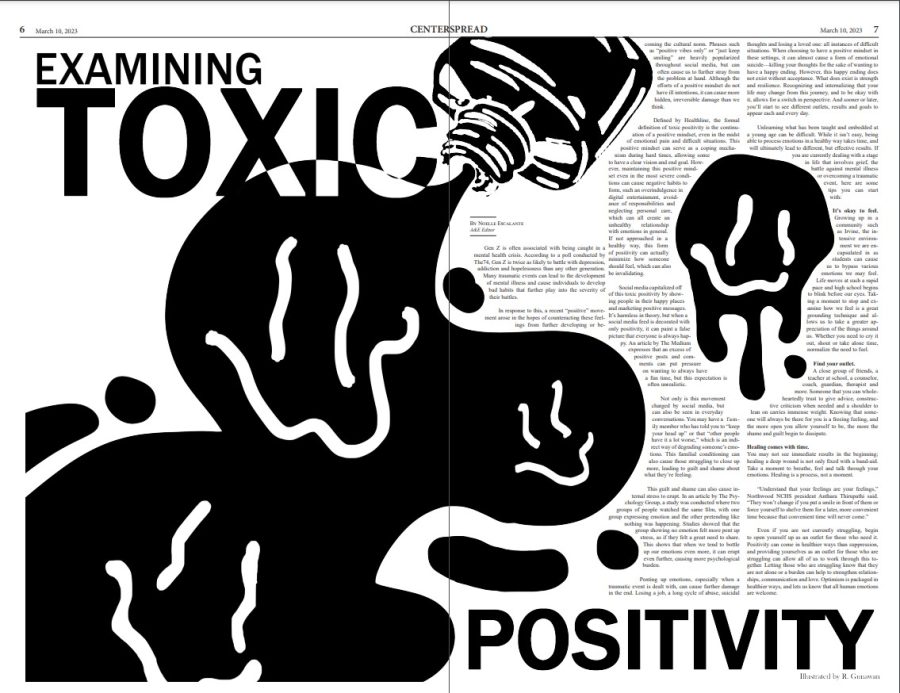Examining Toxic Positivity
March 12, 2023
Gen Z is often associated with being caught in a mental health crisis. According to a poll conducted by The74, Gen Z is twice as likely to battle with depression, addiction and hopelessness than any other generation. Many traumatic events can lead to the development of mental illness and cause individuals to develop bad habits that further play into the severity of their battles.
In response to this, a recent “positive” movement arose in the hopes of counteracting these feelings from further developing or becoming the cultural norm. Phrases such as “positive vibes only” or “just keep smiling” are heavily popularized throughout social media, but can often cause us to further stray from the problem at hand. Although the efforts of a positive mindset do not have ill intentions, it can cause more hidden, irreversible damage than we think.
Defined by Healthline, the formal definition of toxic positivity is the continuation of a positive mindset, even in the midst of emotional pain and difficult situations. This positive mindset can serve as a coping mechanism during hard times, allowing some to have a clear vision and end goal. However, maintaining this positive mindset even in the most severe conditions can cause negative habits to form, such an overindulgence in digital entertainment, avoidance of responsibilities and neglecting personal care, which can all create an unhealthy relationship with emotions in general. If not approached in a healthy way, this form of positivity can actually minimize how someone should feel, which can also be invalidating.
Social media capitalized off of this toxic positivity by showing people in their happy places and marketing positive messages. It’s harmless in theory, but when a social media feed is decorated with only positivity, it can paint a false picture that everyone is always happy. An article by The Medium expresses that an excess of positive posts and comments can put pressure on wanting to always have a fun time, but this expectation is often unrealistic.
Not only is this movement charged by social media, but can also be seen in everyday conversations. You may have a family member who has told you to “keep your head up” or that “other people have it a lot worse,” which is an indirect way of degrading someone’s emotions. This familial conditioning can also cause those struggling to close up more, leading to guilt and shame about what they’re feeling.
This guilt and shame can also cause internal stress to erupt. In an article by The Psychology Group, a study was conducted where two groups of people watched the same film, with one group expressing emotion and the other pretending like nothing was happening. Studies showed that the group showing no emotion felt more pent up stress, as if they felt a great need to share. This shows that when we tend to bottle up our emotions even more, it can erupt even further, causing more psychological burden.
Penting up emotions, especially when a traumatic event is dealt with, can cause further damage in the end. Losing a job, a long cycle of abuse, suicidal thoughts and losing a loved one: all instances of difficult situations. When choosing to have a positive mindset in these settings, it can almost cause a form of emotional suicide—killing your thoughts for the sake of wanting to have a happy ending. However, this happy ending does not exist without acceptance. What does exist is strength and resilience. Recognizing and internalizing that your life may change from this journey, and to be okay with it, allows for a switch in perspective. And sooner or later, you’ll start to see different outlets, results and goals to appear each and every day.
Unlearning what has been taught and embedded at a young age can be difficult. While it isn’t easy, being able to process emotions in a healthy way takes time, and will ultimately lead to different, but effective results. If
you are currently dealing with a stage in life that involves grief, the battle against mental illness or overcoming a traumatic event, here are some tips you can start with:
It’s okay to feel.
Growing up in a community such as Irvine, the intensive environment we are encapsulated in as students can cause us to bypass various emotions we may feel. Life moves at such a rapid pace and high school begins to blink before our eyes. Taking a moment to stop and examine how we feel is a great grounding technique and allows us to take a greater appreciation of the things around us. Whether you need to cry it out, shout or take alone time,
normalize the need to feel.
Find your outlet.
A close group of friends, a teacher at school, a counselor, coach, guardian, therapist and more. Someone that you can whole-heartedly trust to give advice, constructive criticism when needed and a shoulder to lean on carries immense weight. Knowing that someone will always be there for you is a freeing feeling, and the more open you allow yourself to be, the more the shame and guilt begin to dissipate.
Healing comes with time.
You may not see immediate results in the beginning; healing a deep wound is not only fixed with a band-aid. Take a moment to breathe, feel and talk through your emotions. Healing is a process, not a moment.
“Understand that your feelings are your feelings,” Northwood NCHS president Anthara Thirupathi said. “They won’t change if you put a smile in front of them or force yourself to shelve them for a later, more convenient
time because that convenient time will never come.”
Even if you are not currently struggling, begin to open yourself up as an outlet for those who need it. Positivity can come in healthier ways than suppression, and providing yourselves as an outlet for those who are struggling can allow all of us to work through this together. Letting those who are struggling know that they are not alone or a burden can help to strengthen relationships, communication and love. Optimism is packaged in healthier ways, and lets us know that all human emotions are welcome.



![AAAAAND ANOTHER THING: [CENSORED] [REDACTED] [BABY SCREAMING] [SIRENS] [SILENCE].](https://thehowleronline.org/wp-content/uploads/2025/06/lucy-1200x800.jpg)






















































![AAAAAND ANOTHER THING: [CENSORED] [REDACTED] [BABY SCREAMING] [SIRENS] [SILENCE].](https://thehowleronline.org/wp-content/uploads/2025/06/lucy-300x200.jpg)